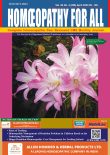Homeopathy and Heat Stroke A Gentle Approach to Healing
Keywords:
Heat Stroke, Homeopathic Medicine, Homeopathic Medicine , Remedies, Headache, Dehydration, Central Nervous System, Clinical ResearchAbstract
Heat stroke is a potentially fatal medical condition marked by a sudden rise in body temperature, frequently above 104°F (40°C), and malfunctioning of the central nervous system. Rapid cooling and supportive care are the mainstays of conventional treatment, although complementary and alternative therapies like homeopathy are gaining popularity. An extensive analysis of homeopathy's application in the treatment of heat stroke is given in this article. When treating heat stroke, homeopathy takes a comprehensive approach, taking into account each patient's unique symptoms and constitutional makeup. The patient's particular symptoms, such as a high fever, headache, confusion, and dehydration, are taken into consideration while choosing a course of action. Clinical research and case studies indicate that homeopathic remedies can help reduce symptoms, speed up recovery, and avoid problems related to illness when used promptly and effectively.
Downloads
References
1. Bouchama A, Knochel JP. Heat stroke. New England journal of medicine. 2002 Jun 20;346(25):1978-88.
2. Kumar A, Singh DP. Heat stroke-related deaths in India: An analysis of natural causes of deaths, associated with the regional heatwave. 2021 Jan[Cited 2024 Apr 02];95:102792. Available from https://doi: 10.1016/j.
jtherbio.2020.102792
3. 1.Leon LR, Helwig BG. Heat stroke: Role of the systemic inflammatory response. Journal of Applied Physiology. 2010 Dec;109(6):1980–8.
4. Morris A, Patel G. Heat Stroke. [Updated 2023 Feb 13]. In: StatPearls [Internet].
Treasure Island (FL): StatPearls Publishing; 2024 Jan-. Available from: https:// www.ncbi.nlm.nih.gov/books/ NBK537135/
5. Marchand M, Gin K. The cardiovascular system in heat stroke. CJC open. 2022 Feb 1;4(2):158-63.
5. Kushimoto S, Yamanouchi S, Endo T, Sato T, Nomura R, Fujita M, Kudo D, Omura T, Miyagawa N, Sato T. Body temperature abnormalities in non-neurological critically ill patients: a review of the literature. Journal of intensive care. 2014 Dec;2:1-6.
6. Hughes WT, Armstrong D, Bodey GP, Bow EJ, Brown AE, Calandra T, Feld R, Pizzo PA, Rolston KV, Shenep JL, Young LS. 2002 guidelines for the use of antimicrobial agents in neutropenic patients with cancer. Clinical infectious diseases. 2002 Mar 15;34(6):730-51.
7. Lim CL, Mackinnon LT. The roles of exercise-induced immune system disturbances in the pathology of heat stroke: the dual pathway model of heat stroke. Sports Medicine. 2006 Jan;36:39-64.
8. Lilienthal S. Homoeopathic therapeutics. B. Jain Publishers; 1998.
9. William Boericke. Boericke’s New Manual of Homoeopathic Materia Medica with Repertory. #Augmented edition based on 9th edition. New Delhi: B Jain Publishers (P) LTD; c2018.
10. Allen HC. Allen’s keynotes rearranged and classified with leading Remedies of the Materia Medica and Bowels Nosodes including Repertorial index. #10th edition. Delhi: B.Jain Publishers (P) Ltd.; c2016
11. James Tyler Kent. Lectures in Homoeopathic Materia Medica
Together with Kent’s New Remedies’ incorporated and arranged in alphabetical order. #First edition. New Delhi: B. Jain Publisher (P) Ltd.; c2020.
12. John Henry Clark. A Dictionary of Practical Materia Medica. NewDelhi: B. Jain Publisher (P) Ltd.; c2005




